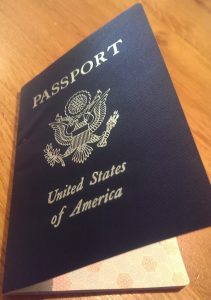Giving up US citizenship?
For several years, I’ve been thinking about giving up my American citizenship.
This is not an act of disloyalty or of protest, I hasten to add. I admit there have been moments – when George W. Bush was reelected, for example – when I was angry enough to repudiate my nationality in protest. But I feel an emotional attachment to the United States that anyone who grew up there would understand.
Note: This article is part 1 of a series about giving up US citizenship. At the end of the article you can link to the next installment.
The reason I’ve considered giving it up is purely practical and has to do with taxes.
I hasten to add, again, that this is not about disloyalty. I love the US and I’m not trying to avoid paying taxes. In fact, my income is taxed in the Netherlands at a far higher rate than it would be if I lived in the US.
As an expatriate American, however, I’m still required to pay taxes to the US as well because the US taxes non-residents on world-wide income, although the first $97,600 (the 2013 figure; it goes up each year) that I earn is exempted. As a teacher, I’ll never earn that much. According to the Wall Street Journal, the only other nation that taxes non-residents on world-wide income is Eritrea (though North Korea may also do so, but no one really knows).
Like everyone, I hate filling out tax forms. As an expat, it’s the long form, plus schedules, plus an extra form to claim the expatriate exemption. And it has always annoyed me that I was required to fill out these forms at all, knowing that I wouldn’t have to pay because of the exemption. I pay an accountant to do it instead, but I resent that expense because of its pointlessness.
Once I gained Dutch citizenship, thoughts of giving up my US citizenship centered on these pointless forms.
The last straw was the new “FBAR” form, the “Report of Foreign Bank and Financial Accounts,” introduced a few years ago. Expatriate Americans are required to fill in yet another form, listing every account that has their name on it, along with the highest balance each account carried in that tax year. I object to this form for three reasons:
- It’s none of their damn business how much money my husband and I have in which accounts.
- It’s a nightmare to fill in! Dutch accounts don’t show a running balance, so I end up having to sit down with a calculator and do a year’s worth of arithmetic to figure at what point each account had its highest balance.
- What’s the point? I assume this is meant to be some sort of information-gathering exercise to catch money launderers or terrorists or to prevent people from hiding their money from the US tax authorities. How does knowing my highest balance on my accounts help that effort when you don’t know what that money was for? (We bought a house last year so our active accounts had very high amounts for about a day.)
So when the FBAR requirement started, that’s when I got serious about giving up citizenship. I knew it would take a few years as I moved my pension money out of the US and generally consolidated my finances. The idea of never having to fill out all these forms again (or pay someone through the nose to do it for me) made it worth it.
But now, the US has put another big stumbling block in my way: they’ve raised the price.
That’s right: Americans have to pay to give up their citizenship. The price was $450, which is ridiculous already. Just this month, the price was quietly raised to $2,350!
According to Yahoo News, the price rise might be an attempt to crack down on US citizens who are “hiding their wealth overseas.”
It is also a response to increased renunciations of citizenship due to – surprise! – the onerous FBAR form.
I don’t have any great wealth to hide. I just don’t want to fill out those forms anymore. There are no real practical advantages to keeping my US citizenship; only inconveniences.
According to the same article, Senator Ted Cruz wants a law passed that would take away the citizenship of anyone who goes to Syria or Iraq to help ISIS terrorists.
This seems woefully unfair. These “bad guys” can give up their citizenship for free, while the rest of us “good guys” – law-abiding, peaceful people – get slapped with a $2,350 fine? Really?
The US isn’t earning any tax payments from expats with moderate incomes, like me. The purpose of making its non-resident citizens report world-wide income is to raise tax revenue from wealthy expats. These wealthy expats are the ones who can afford to pay the $2350 fee, which is probably significantly less than their tax bill would be.
The end result: lower tax revenues from expats, and a whole lot of angry expats who want to give up citizenship. Has Congress really thought this through?
My whole US citizenship series:
- Part 1: Giving up US citizenship?
- Part 2: Republicans, expatriates, and FATCA
- Part 3: How my citizenship hit me in the gut
- Part 4: My renunciation day
- Part 5: Thanksgiving reconsidered
- Part 6: FATCA, the Tea Party, and me
- Part 7: Individual freedom, self-reliance and renunciation
- Part 8: Equality? Competition? Not overseas!
- Part 9: The American Dream
- Part 10: The irony of renouncing under duress
- Part 11: Open letter to President Obama in response to the State of the Union Address
- Part 12: 7 Reasons NOT to renounce
- Part 13: Citizenship matters
- Part 14: Citizen of a parallel world
- Part 15: Renunciations in the news
- Part 16: Vote … as a non-citizen? Really?
- Part 17: The ridiculous story of a pilot and his taxes
- Part 18: On receiving my Certificate of Loss of Nationality
- Part 19: So you think you want to emigrate…
- Part 20: Indignation Fatigue and FATCA
- Part 21: The US election, as seen by Americans overseas
- Part 22: On receiving my California voter ballot
- Part 23: Watching America fall apart on my renunciation anniversary





Rachel, I think your misery needs some company and you will find plenty at isaacbrocksociety dot ca. This is a very active forum which has been discussing these issues for almost 3 years. Many have described their renunciation experiences and now a lawsuit has been launched in opposition to the adoption of the US FATCA law by the current Canadian government (check out stopfatca dot ca). We hope some similar action will be started in Europe too.
Thank you, Em, for pointing that out to me (as did someone on my twitter feed — was that you?). I had the feeling that because we’re all so scattered around the world, we all had to figure it out on our own. About the lawsuit: it seems to be about the reporting that the US government is demanding from other governments. Is there a lawsuit by the expats themselves as well? I mean to change the requirement that we file in the US?
There’s a legal challenge to FATCA in the USA too. You can learn more at fatcalegalaction.com. The lead lawyer is James Bopp. There are no legal challenges to US citizenship-based taxation (CBT) that I’m aware of but perhaps that will be the next step if FATCA litigation is successful. The ACA (American Citizens Abroad) produced an excellent video outlining the case for abolishing CBT in favour of the international norm of RBT (residence-based taxation). You can watch it here: http://www.youtube.com/watch?v=DKFEpAWjeu4
Thanks for the link, Em! I would think if the FATCA litigation is successful, they’d have to rethink the whole law, wouldn’t they?
I don’t think the USA ever really thinks anything through but I still hope for successful anti-FATCA litigation (expect it to take a long time to make its way to the Supreme Court) which will possibly force a rethink about CBT. I’ve been giving my monthly Canadian pension cheques to the Alliance for the Defence of Canadian Sovereignty (adcs-adsc.ca) because I believe FATCA must be defeated before there’s any chance at bringing down US CBT. CBT was their dirty little secret before they passed their insane FATCA law which is slowly shedding light on their treacherous taxation system. BTW, I am not and never have been American but my husband used to be (relinquished last year).
True! I didn’t ever really question CBT as such; just the necessity for me to fill out the forms when I never reach the limit. Now I’ve learned more about it because of FATCA and realized that CBT is unjust.
I am late to this, very late indeed but, it was me who posted on your twitter feed as AtticusinCanada.
It gave up my U.S. citizenship, never would owe a dime in taxes. My Canadian spouse makes all of our income, was livid at the U.S. violating Canada’s laws, his rights and claiming that they had every right to send HIS banking information to FINCIN with no wrong doing at all. Some people are put in a very hard place by FATCA who should not be intended targets at all. To me this sort of thing is worse than the NSA spying on emails and phone calls. Soon those lauding these efforts will fidn the next excuse that comes along will mean their own banking data going to Home land security and every other agency the U.S. deems fit, they’ll have no say so just like we haven’t had. We’ll see when home landers have to put up with this how wonderful they think it is.
It’s like that poem:
First they came for the Socialists, and I did not speak out—
Because I was not a Socialist.
Then they came for the Trade Unionists, and I did not speak out—
Because I was not a Trade Unionist.
Then they came for the Jews, and I did not speak out—
Because I was not a Jew.
Then they came for me—and there was no one left to speak for me.
Well said. It’s incredible that the United States is causing so many of it’s own citizens to turn against them by these ridiculous policies.
Exactly! Turning us against them, and losing a money stream at the same time! Thanks for commenting, John!
Yes, they have. Their intention was to tax and penalize expatriates. They know that is where the money is coming from.
Everything they say about tax avoision is just a bunch of bs that they tell to the sheeple.
They fully intended to chase down all xpats in the world and fully intended to create a bunch of paperwork for the compliance industry, because the compliance industry runs the country and now with FATCA they run the world.
But people like me who are below the threshold: we don’t owe them taxes anyway, by their own reckoning. So the IRS doesn’t make anything from me; just the accountants do. I can see that people above the threshold will owe more in taxes, but wouldn’t they make more if they didn’t alienate them so that they’d renounce their citizenship? Keeping the wealthier expats happy would keep the tax money coming in, wouldn’t it?
I have been deliberating renunciation also. I live in the UK. I haven’t gone over the threshold either, but I have a goal to in the next couple of years should I do well with a couple of ventures. Also, I have stocks & shares. Even though I haven’t gone above the threshold with all of my income inclusive of stocks & shares, I have recently discovered through a Canadian Lawyer that the USA taxes differently on investment than the UK does, which means without my knowledge (as I’m really only just learning what I should have been doing all this time!), I may have actually owed tax money on investments that I had previously deemed below my overall required threshold. Lastly, I have been considering spreadbetting which in the UK is tax exempt, but in the USA is taxed at 40%. Why should I have to pay tax in any other country when I pay it in full in my country of residence? I get no benefit at all from having a US passport aside from being able to easily live in the USA (where half of my family lives) should I wish to go back. I don’t use their medical care without paying for it myself or using Travel Insurance. I use their services and facilities the same way any worldwide traveller visiting would. There is literally no added benefit. But it is my identity. I feel like I am being penalised for deciding to live in Europe where the other half of my family is. I genuinely feel like there is nowhere to turn. And as Rachel very rightly said, not only are you liable to 2 country’s taxation, but you have the accountant fees and paperwork multiplied by 2, your time multiplied by 2 and the stress of questioning if you have done it correctly. I have never flouted taxation law in the UK. To answer to a country where I earn no income, where I do not vote in the elections because I only vote where I reside, where I haven’t visited for more than 3 months out of any year (sometimes don’t visit at all in a year)…what right do they have? I think it is against our human rights as a citizen versus a resident as it is exploiting people who haven’t done anything wrong. When you are born, you are not owned by a country, and what they have done is deem that they own us whether we live there or not, and they believe they can levy tax on us as their right to ownership of us. What happened to our rights? I know of no lawsuit in the UK against the USA’s handling of dual citizen taxation or FATCA, but I really hope someone, who understands more than I do, starts one.
There’s a lawsuit going on in Canada over this, according to the website in the first comment above. Maybe that will eventually get Congress to change this.
I think the main advantage that US citizenship gets us is the ability to move back there if we ever want to. If we give up citizenship, that’s it. We’re expats forever.
Uhm, you realize that the FBARs have been required for decades, right? They are not new. It just occurred to Treasury/IRS a few years ago that they could “shock and awe” US expatriates by imposing drastic penalties for not filing them.
Perhaps you’re confusing it with FATCA, which was passed in 2010 and makes life abroad for “US persons” unbearable?
Really? Well, it was news to me at the same time that FATCA was passed. My accountant told me about the amnesty, so I’ve only done FBARs for the last few years. As far as I’m concerned they’re both unbearable and oppressive.
I relinquished mine last year for similar reasons though I’d never owe any U.S. tax *Hint most expats are not rich!* My Canadian spouse makes all of our income here in Canada at his Canadian job. He was LIVID that the U.S. thought they had a right to his banking information just because he married an American and shares a checking account, mortgage and savings with me. We pay tax here in Canada at a very high rate compared to the U.S. and gladly so for the services we use. The tax forms were always a pain in the rear to him since you end up having to pay someone to do them for the U.S., we never owe but, that money comes out of my spouses Canadian pay check and we are living paycheck to paycheck, have a kid in college who can use that money better. When FATCA came along and the Canadian side of my family found out the U.S. laid claim to their banking information with zero evidence of any wrong doing or warrant *just have an American in the family* that was the last straw. I could take my name off everything we own leaving me a pauper and if something happened to my spouse I’d be in big trouble, get a divorce or relinquish my U.S. citizenship. Those were my choices. What kind of country does this to people? I spent three years writing congress critters, House Ways and Means and doing media about it thinking some of this might be amended but, no it isn’t going to be.I anguished over this, wore a groove in the floor many a long night and STILL consider myself American as that is where I was born and raised but, on paper I am no longer American. Nina Olsen the tax payer advocate told congress some people would not be able to keep their citizenship because of FATCA and congress did not care. We’re just collateral damages to them.
Good description: collateral damage. I’m very curious to see what the new Republican-dominated Congress does. Which is why I’m going to wait a bit to see if they do something about this before I shell out all that money to relinquish. It occurred to me just the other day that my son (16 years old) will eventually have to relinquish too. That’s $2350 times 2! We can’t afford that right now! Thank you for commenting.
Why would the US citizen son need to give up his citizenship? Shouldnt it be his decision to give it up or not.
Absolutely. Parents are not allowed to renounce for their children. When a kid’s 18 he/she can decide for himself. My son decided to renounce at age 19. My daughter (25) has decided not to for now.
Relinquishing is free but, renouncing is not. Kids born dual cannot relinquish, they must renounce and yeah I’ve got a kid caught in this too. Born in Canada, raised in Canada. He will have to renounce. I was allowed to relinquish, it is two different processes with the same outcome. You are no longer a U.S. citizen. One has a high fee and the other does not. One is auto approved and you just wait for your CLN, the other has to be approved in D.C. first *relinquishing* So I didn’t have to pay the fee and didn’t have to renounce *I hate that word!* but, my son will have to renounce and will not be allowed to relinquish. Confusing I know. I waited three years for the same reasons as you but, I couldn’t wait any longer in my situation. Toronto consulate has no appointments to renounce or relinquish until well into June 2015. They are VERY backed up with these and this is disgraceful. My kid is a college student with big college loans so we’ll have to wait to get him un Americanized. It’s too expensive to renounce him right now.
@AtticusinCanada
Everyone pays now: new rules…they just keep on making up more rules, designed to crush any true freedom, & the sheeple just keep chanting, “we’re #1, we’re #1!”
This isn’t going to end well.
I just wonder how many of us will have to renounce before anyone sees the negative consequences. The increase in renunciation has been reported in the US press, but so far no one seems to care. I think the numbers seem very small so far.
I meant “renounced,” but what is the difference? If it’s free, I’d prefer to relinquish! How did you arrange that?
There’s a back-up here (the Netherlands) too, I’ve heard, but not as long as there.
Thanks for the comment!
Wow….this isn’t surprising but it certainly is infuriating.
You said it, Bekah!
Relinquishment went from free to $2,500! I hope there is a waiver! That is a year’s income for us!
The fee is $2350, and as far as I know, there is no waiver. That’s yet another issue: people who want to renounce but simply can’t afford it.
Hi Rachael. Is there a waiver? I don’t make $2,300 a year! No way I can pay that much, ever! Thanks.
No, there’s no waiver, as far as I’ve ever heard. They have no reason to offer any sort of waiver when they don’t actually want people to renounce. They want you to stay a citizen so you’ll always be required to file and pay taxes to the US, no matter what.
I hear your pain. I have read through your other entries on this topic and see you have happily renounced. I have been considerung this also after having settled in the UK since 1990. I have no intention on living there again. I do have my 80 year old dad in Boston, although it is unlikely that I would be expected to care for him when that is needed. I will be the only beneficiary on his will and wonder if I would have difficulties with banking there (being responsible for his accounts as his power of attorney if needed) if I am not a US citizen. I am wondering if you had any assistance with renouncing, i.e., if you used a service like an Expat tax accountancy, or if you navigated everything yourself. Extra note – my husband and I have spent some time in Nijmegen for his working sabbatical! We have fallen in love with the Netherlands, and tgere was even a job prospect for him where yiu are based.
I used an expat tax accountant who was familiar with both US and Dutch tax law. I don’t know anything about inheritance law, though. I’d suggest you consult a lawyer about that – both a US one and a UK one, or someone familiar with both sets of inheritance law. I can only guess that being executor would be really complicated whether you renounce or not, just because of the distance, but you should ask an expert.
https://www.nytimes.com/2023/10/06/us/american-citizenship-fee-lawsuit.html
Yes, I’m one of the named plaintiffs in this lawsuit.
Rachel, I came across your blog while searching for info about Americans who give up citizenship to become Dutch citizens. I’m in my 4th year of studying Dutch and enjoying the new friends I’ve made. While I nave no plans to leave the U.S. I have wanted to understand what the causes and motivations are for such a serious step. I never would ask someone such personal questions face to face, so seek info online. This could be a very touchy subject to approach in realtime conversations. Thank you for sharing so much of your thoughts and emotions on the subject. I will continue to read your series and consider what you offer.
Thank you! It is very touchy, and I tend to avoid discussing it in face-to-face conversation because Americans tend to take offence or jump to the wrong conclusions about why I did it.